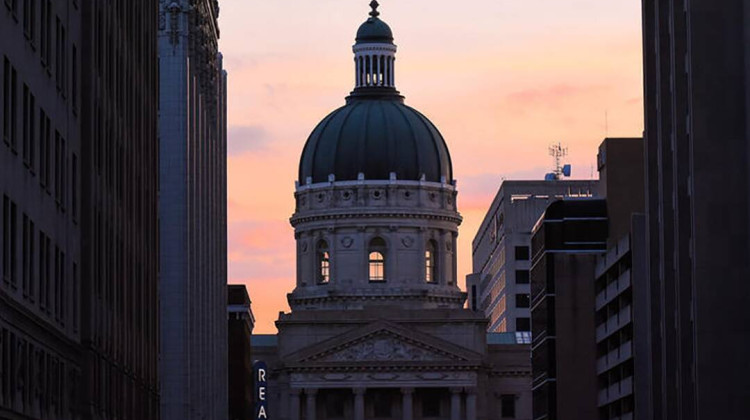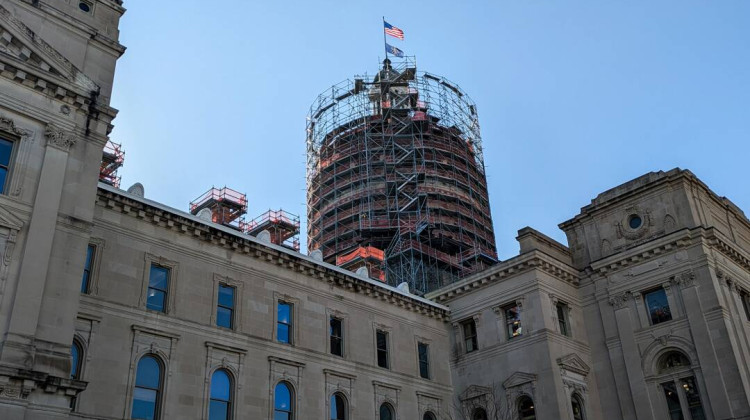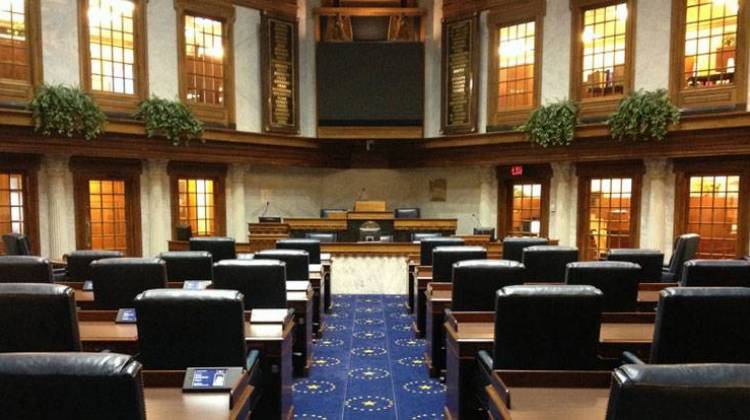
Solar advocates at the 2023 Renewable Energy Day at the Indiana Statehouse. Some speakers at the event condemned Indiana utilities' influence on lawmakers.
Ben Thorp/WBAAThere were several bills proposed during this year's legislative session that had to do with energy and the environment in Indiana. Here’s a run-down of some of the bills that passed and failed during this year’s legislative session.
A list of all of the bills proposed during the 2023 session is on the Indiana General Assembly’s website. Or check out our bill tracker.
What passed:
HB 1007: Electric utility service
The bill requires the state agency that oversees utilities to consider five things in most of its decisions: reliability, affordability, resiliency, stability and environmental sustainability. It also cuts in half the amount of power utilities can buy from the grid during peak demand. That means they’d have to show they can generate about 85 percent of their energy themselves or from contracts with other companies. Proponents of the bill hope it will help ensure electric utilities in the state are reliable as Indiana moves toward more renewable energy sources.
This bill aims to cut ties between the state and financial institutions with certain ESGs. ESGs are policies that consider the environmental or social impacts of their investments. The author of the bill, Rep. Ethan Manning (R-Denver), said institutions with ESGs are discriminating against Indiana businesses like coal companies and firearm makers. This legislation requires the state treasurer to make a list of financial investment managers with ESGs and provide evidence as to why the state shouldn’t invest its pension funds with them. The Indiana Public Retirement System can’t have a contract with those managers with only a few exceptions. The state could keep doing business with them if there wasn’t a comparable provider — or if ending that contract wouldn’t provide financial benefits for pensioners. The original version of the bill would have cost state pensioners $6.7 billion in returns. Now that it’s been heavily amended, it’s unclear if pensioners will see losses.
HB 1138: Preschool and child care facility drinking water
It requires preschools and day care centers to test for lead and take action if lead levels are too high — likely by replacing faucets and other lead fixtures in the building.The one exception would be child care run by a church. Kids with lead poisoning can have trouble learning, behavioral issues and poor kidney function. The bill’s author Rep. Carolyn Jackson (D-Hammond) was also successful in passing a law requiring lead testing in the drinking water at schools in 2020.
HB 1219 and HB 1341: Protecting firefighters from PFAS
Both bills aim to protect firefighters from a potential cancer risk caused by the chemicals. HB 1341 doesn’t allow Indiana fire departments to purchase gear unless it has a label stating whether or not it contains PFAS. There is no PFAS-free alternative to the existing moisture barriers, but supporters hope it will put pressure on the federal government to develop PFAS-free gear. HB 1219 created a pilot program to test for PFAS in the blood of up to 1,000 firefighters.
SB 9 and HB 1417: Electric utility deferred costs and accounting practices
Both of these measures let utilities recoup a number of “unexpected” additional costs from its customers with pre-approval — as long as the Indiana Utility Regulatory Commission approves them after the fact. The bills stemmed from an Indiana Supreme Court case involving Duke Energy. The utility had already built the cost of cleaning up its coal ash into customers’ rates, but it asked for another rate increase in 2019 when cleanup ended up being more pricey than it thought. The Indiana Utility Regulatory Commission approved the increase, but the court called it “retroactive ratemaking” — which is illegal. Soon after SB 9 passed, Duke Energy asked for a rehearing in the case.
HB 1420: Electric transmission facilities
The bill gives Indiana utilities dibs on building, owning and operating power lines that cross state borders. To meet federal renewable energy goals, the U.S. will have to build a lot more of these lines to get that electricity where it needs to go. Proponents of the bill said Indiana utilities are regulated by the state — letting them do more of these projects will keep costs in check for Hoosiers and encourage local, union jobs. The bill got support from the Indiana Farm Bureau, Indiana Manufacturers Association, and unions representing steelworkers, electrical workers and operating engineers. But consumer advocates, clean energy supporters and renewable energy companies opposed the bill. They said the idea that giving utilities dibs would lower costs doesn’t make any sense — the best way to do that is through competition. A similar law in Texas was struck down by a federal circuit court which said it violated interstate commerce laws.
HB 1421: Energy production and resources
The bill allows utilities to recover the cost of natural gas plants as they’re being built. Indiana utilities and other supporters have said it helps avoid “rate shock” by easing the cost of those plants into customers’ bills over a longer period of time. It’s something utilities are already allowed to do while building other power sources — like wind farms and coal plants. But consumer advocates have said ratepayers shouldn’t have to pay for a plant that isn’t running yet.
This bill prevents Indiana from making coal ash rules stricter than federal ones. Some lawmakers and environmental groups worry this could prevent the Indiana Department of Environmental Management from doing what’s best to handle toxic coal ash in the state. The waste leftover from burning coal can have toxic heavy metals like mercury, cadmium and arsenic – which can get into the groundwater and pollute local drinking water sources. IDEM is in the middle of creating a state permitting program for coal ash based on a law passed two years ago. The Hoosier Environmental Council said, because the federal government hasn’t finalized guidelines for state programs like this, the bill could call into question anything Indiana has done to regulate coal ash that isn’t spelled out in federal rules. The bill states that the Ohio Valley Electric Corporation doesn’t have to follow new state rules for its coal ash ponds at its Clifty Creek power plant until it can meet federal requirements.
SB 33: Solar panel and wind power equipment disposal study
The U.S. hasn’t found a cost-effective way to recycle panels and turbines yet. That could mean a lot of waste in the next 20 to 30 years as the less efficient ones operating today reach the end of their useful life. The bill directs the state Department of Environmental Management to work with the Utility Regulatory Commission to study the issue and a potential state program to manage it.
This bill allows the state to increase air permit fees for companies that pollute. The Environmental Protection Agency sent a letter to the Indiana Department of Environmental Management warning the agency that their revenue was too low to support its air program. It said that the EPA could take over the program if IDEM was unable to generate more revenue.
SB 176: Small modular nuclear reactors
The measure allows a slightly larger small modular nuclear reactor to be built in Indiana to accommodate technology by Rolls Royce. Last year, Indiana passed a law instructing a state utility commission to lay the groundwork and offer incentives for small modular nuclear reactors or SMRs. This bill ups the megawatt capacity limit from 350 megawatts to what Rolls Royce’s is expected to be — 470 megawatts. According to the International Atomic Energy Agency, anything above 300 megawatts but below 700 megawatts would actually be considered a “medium” nuclear reactor. But the federal government doesn’t have a strict definition. Proponents of SMRs say they’re cheaper and safer than reactors currently operating today. But there are a lot of unknowns about SMRs. None of them have been built in the U.S. and many proposed projects are already over budget — some by billions of dollars. The Union of Concerned Scientists and environmental groups also question the safety of the plants and their waste.
The bill allows property owners the choice of using the Indiana Department of Natural Resources’ floodplain maps or hiring an outside engineer for a survey. It strikes a compromise between rural homeowners who say the DNR’s maps are too restrictive and groups representing Indiana surveyors, floodplain managers and environmentalists that say they’re more protective. Two years from now, all local floodplain administrators have to go through training under the bill. Sellers would have to disclose to buyers if part of the property is in the floodplain. Floodplain administrators also can’t grant a permit if it would violate requirements from the National Flood Insurance Program.
SB 246: Excess liability trust fund
The bill uses some money for cleaning up gas leaks for upgrades at the state’s airports. Taxpayers, gas station owners and airports all pay into the Excess Liability Trust Fund — or ELTF. It’s a kind of insurance that goes to help clean up underground fuel tanks when they leak. This legislation puts the amount airports pay into a separate fund that could be used for above-ground tank cleanups as well. Anything leftover at the end of the fiscal year would go to infrastructure improvements at Indiana’s airports.
SB 390: Commercial solar and wind energy ready communities
Renewable energy companies say all of the different local ordinances in Indiana have made it difficult to build renewable energy projects — especially for something like a wind farm that can span multiple counties. That’s why lawmakers created voluntary state guidelines for renewable projects two years ago. The bill gives counties that adopt the guidelines $1 for every megawatt hour of energy generated by the project, every year for a decade. But that’s only if the state can get the money through federal grants. Lawmakers have opposed using taxpayer dollars for the renewable-ready program for the second time since it was set up.
SB 451: Carbon sequestration pilot project
This bill aims to make a state pilot program on carbon sequestration more competitive for federal grants by clarifying how Wabash Valley Resources will get property rights. Landowners can’t opt-out of the project, but they would have to be paid about $100 an acre per year for the life of the project — 40 percent of the average cash rent in Indiana based on an annual Purdue survey. Environmental groups are concerned that leaking CO2 emissions from carbon capture and storage projects could pollute drinking water sources, suffocate residents and animals, or cause earthquakes. Lawmakers approved the pilot project about four years ago. If the company can’t get a federal permit in five years, the bill would kill the pilot.
The legislation encourages companies that chemically recycle plastic to come to Indiana. Things like toothpaste tubes often can’t be recycled because they’re made up of multiple kinds of plastic. Companies like Brightmark in northeast Indiana use heat and chemical processes to break down plastics into materials that can be used again. The bill regulates those businesses as advanced recycling manufacturers. That means they wouldn’t have to get a solid waste license and could possibly be eligible for state grants. But a University of Pittsburgh professor questions whether some of these chemical processes should be considered recycling at all.
Join the conversation and sign up for the Indiana Two-Way. Text "Indiana" to 73224. Your comments and questions in response to our weekly text help us find the answers you need on statewide issues, including this series on climate change and solutions.
What failed:
SB 335 and HB 1453: Climate solutions task force
Both of these bills aimed to create a task force to study solutions to climate change in Indiana. The task force would have studied topics like acquiring land for nature preserves, creating a carbon credit market, funding energy efficiency measures and expanding mass transit. This is the second year youth climate activists with Confront the Climate Crisis have worked with lawmakers to craft such legislation. A Senate committee adjourned for the first half of the session without voting on SB 335. HB 1453 didn’t receive a hearing — much like the two climate task force bills proposed last year.
SB 221: Energy audit of state government campus
The measure would have required the state to hire a company to do an energy audit of the Indiana Statehouse. If the state decided to fix things like leaky windows as a result of the audit, it could save taxpayers money. Despite getting unanimous support in the House and multiple committees, the bill didn’t receive a needed hearing in the House Ways and Means Committee.
Wetland language in SB 414: Onsite waste management districts and septage holding tanks
An amendment to the bill aimed to clarify definitions in the state’s controversial wetlands law. The 2021 law removed protections for Class 1 wetlands — less pristine wetlands that still help reduce flooding and improve water quality. That was supposed to make it easier for developers and farmers to work on their land. But some lawmakers and developers say the Indiana Department of Environmental Management has been upgrading these wetlands to Class 2 and Class 3 — which are still regulated by the state. The amendment was added to a bill on septic systems after it had already passed the state Senate and a House committee. Though the bill was signed into law by the governor, the amendment was taken out. It was considered not germane – or relevant – to the bill.
SB 449: Regulation of combined sewer overflows
The bill would have given some slack to Indiana cities with combined sewers. These are systems where sewage, industrial waste and stormwater are collected together and sent to a treatment plant. During heavy rains, combined sewers can’t handle all that excess dirty water — so some of it gets sent straight into nearby rivers and streams through what’s called a combined sewer overflow or CSO. More than 100 cities in the state have them. The bill would have made it so no water samples could get taken from cities’ CSOs during or after these events. That means the state couldn’t slap them with a violation. The bill passed the state Senate unanimously, but didn’t receive a needed hearing in the House Environmental Affairs Committee.
Find all the bills our statewide team covered during the legislative session in our bill tracker at ipbs.org/projects/2023billtracker/
Rebecca is our energy and environment reporter. Contact her at rthiele@iu.edu or follow her on Twitter at @beckythiele.
9(MDAyMzk1MzA4MDE2MjY3OTY1MjM5ZDJjYQ000))
 DONATE
DONATE






 Support WFYI. We can't do it without you.
Support WFYI. We can't do it without you.